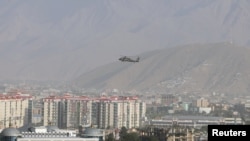The Taliban said Friday its leaders already had conveyed to Turkey their opposition to any foreign troops remaining in Afghanistan after the U.S. and NATO forces leave the war-torn country by a September 11 deadline.
The insurgent group’s statement comes a day after U.S. officials said President Joe Biden and Turkish President Recep Tayyip Erdogan agreed in their meeting Monday that Turkey would continue providing security at the international airport in Kabul, the Afghan capital, following the troop pullout.
“The clear commitment from the leaders was established that Turkey would play a lead role in securing Hamid Karzai International Airport, and we are now working through how to execute to get to that," Jake Sullivan, Biden’s national security adviser, told reporters Thursday.
Taliban spokesman Zabihullah Mujahid, when asked for a response to Sullivan’s comments, told VOA that guarding the airports and other locations in the country is the responsibly of Afghans.
“If foreign forces want to retain a military presence here in the name of airport security, Afghans will not allow it and will view them as invaders, be it Turkey or any other country,” Mujahid told VOA.
He insisted the Taliban maintain “diplomatic ties” with Turkey and seek “brotherly” relations with the Islamic country.
“In recent meetings and discussions with Turkish diplomats they had shared with us [Turkey’s] proposed continued military presence here, but we told them it was unacceptable for us. And they assured us that our stance will be conveyed to their leadership,” Mujahid said.
He added that Turkey and America can discuss their bilateral issues, but it is for Afghans alone to decide on how to conduct their "internal affairs and expect others to respect it.”
Turkey has about 500 troops stationed in Afghanistan as part of a NATO-led non-combatant military mission in the country and has long provided security for the airport.
Kabul airport security is crucial for the working of diplomatic missions in Afghanistan amid concerns intensified hostilities between the Taliban and Afghan forces could plunge the country into another round of civil war following the withdrawal.
The Taliban previously also has expressed opposition to any foreign military presence in post-withdrawal Afghanistan. Sullivan, however, dismissed those assertions, saying Biden and Erdogan tasked their teams to work together to finalize the proposed security plan.
“We do not believe that what the Taliban has said publicly should or will deter the efforts underway right now to establish that security presence, which in turn will enable international missions —diplomatic missions to operate,” Sullivan said.
Australia, which has roughly 80 remaining troops in Afghanistan announced the sudden closure of its diplomatic mission in Kabul earlier this month.
US-Taliban deal
The U.S.-led military drawdown, which formally began on May 1, is stemming from an agreement Washington negotiated with the Taliban in February 2020, to end nearly 20 years of American involvement in the Afghan war.
The Taliban say Turkey’s plans to guard and run the Kabul airport will be a violation of the U.S.-Taliban deal. Peace talks between Kabul and the Taliban, however, which resulted in the deal, have had little success and have mostly been stalled, with each side blaming the other for the deadlock.
Russia also endorsed Friday the Taliban’s assertions. Russian media quoted Moscow’s presidential envoy for Afghanistan, Zamir Kabulov, as saying that Turkey’s proposed plans run counter to the U.S.-Taliban agreement. “Of course, this is a violation," Kabulov said.
Taliban advances
The Taliban also have stepped up attacks and made significant battlefield gains across the country since the foreign troop withdrawal started, capturing fully or partially more than two dozen districts.
Mainstream Afghan TV channel Arian News reported Friday the insurgents have seized control of 37 districts in the past month or so.
Afghan forces have launched counteroffensives to regain the lost territory, leaving scores of combatants dead on both sides. The Defense Ministry claimed Friday that Afghan forces had killed nearly 300 insurgents across different provinces in the last 24 hours.
The Taliban also made similar claims of inflicting heavy casualties on government forces, and it released videos on its social media platforms showing scores of Afghan forces surrendering to the insurgents or joining their ranks.
Both Afghan rivals routinely issue inflated claims about the fighting, which are difficult to verify from independent sources and the real situation remains unclear.
The increase in hostilities also is inflicting casualties on Afghan civilians, who have borne the brunt of the long conflict.





